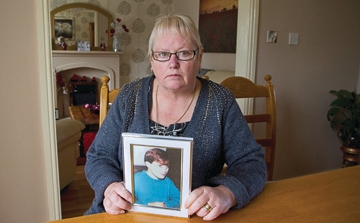You are viewing 1 of your 1 free articles
Bedroom tax: one year on
One year ago the bedroom tax was born amid fears of soaring rent arrears. On its birthday Inside Housing asks just how bad has it been?
‘Let us not go down an uncharted road that is likely to add to the hardship of hundreds of thousands of our poorest citizens,’ implored crossbench peer Lord Richard Best during a Churchillian speech to parliament in December 2011.
The peer was among many to warn of the impact of the bedroom tax, which came into effect a year ago this week. Under the policy, introduced by Work and Pensions Secretary Iain Duncan Smith working-age social housing tenants deemed to have spare rooms had their benefit cut.
As it made its passage through parliament, opponents of the policy argued it is fundamentally unfair as large numbers of affected tenants would not easily be able to move home. Social landlords also complained that the measure would lead to extra rent collection costs and higher arrears. The National Housing Federation warned in November 2011 the policy ‘threatens to blow a hole in landlords’ income streams’.
So, as we near the end of the first year, to what extent were these fears realised?
Impact assessment
The first thing to note is that the numbers currently affected are lower than initial government estimates. A Department for Work and Pensions impact assessment in June 2012 estimated it would hit 660,000 households, saving £480 million in 2013/14 based on an assumption of ‘little tenant mobility’.
However, figures published by the DWP revealed that in November 498,174 claimants were affected by the policy, suggesting a saving of £373 million, £107 million less than expected.
The DWP insists it will still get its predicted savings, within a £30 million margin for error, due to tenants claiming less benefit. It says the lower figure is due to tenants ‘moving house or finding work and increasing their earnings’. However Sam Lister, policy and practice officer at the Chartered Institute of Housing, also suggests it could be due to the difficulty predicting the impact from small survey samples and numerous data sets.
While the numbers may be lower than anticipated, there is also evidence that the impact to landlords in terms of rent arrears has been less severe than feared. A survey of 40 English landlords by auditor Baker Tilly in January reveals only half have reported rising arrears. Gary Moreton, head of social housing at Baker Tilly, says: ‘It has had less of an effect to date than perhaps originally envisaged.’ He suggests the reason for this could be to tenants ‘grinning and bearing it’, and landlords making overly pessimistic predictions.
The slower-than-expected roll out of universal credit, which as of 31 December was only being claimed by 3,780 people, has also played a role.
Phil Gandy, chief executive of 38,000-home Liverpool-based landlord Symphony Housing Group, says: ‘The [rent] arrears situation has not been as bad as our projections, partly because projections depend on roll out of welfare reform.’ Symphony subsidiaries 5,800-home Cobalt Housing and 10,000-home Liverpool Housing Trust have still had a 16 per cent and 20 per cent rise in arrears since last April respectively, equivalent to an increase of £198,000 and £314,000.

Source: Colin McPherson
Margaret Lewis faced a struggle to stay in her home in the street named after her Hillsborough-victim son Carl
Another Liverpool landlord, 14,000-home First Ark, has around £300,000 of extra arrears, pushing their arrears total to £1.84 million in February, but again this is not as high as anticipated - its ‘worst case’ scenario was £1 million of extra arrears in 2013/14. Mr Moreton says a lot of housing associations have now downgraded welfare reform on their risk registers, meaning they consider it less of an immediate threat to their businesses.
But Lord Best cautions against seeing this as success. ‘I don’t regard it as a victory that people have paid the bedroom tax. This policy is reducing the income of people who are on the lowest incomes,’ he says.
Mr Lister adds: ‘Some people might be able to manage to cover the shortfall in the short term by borrowing from family and that sort of thing, but pressure will build over time.’
The overall arrears figures also do not show how many tenants have been pushed into arrears for the first time by the tax. An Ipsos Mori poll for the National Housing Federation last month suggested 72,000 tenants are in rent arrears due to the policy.
Geographical impact
The bedroom tax has had a vastly different impact in different parts of the UK. DWP figures show 52,196 households were affected in London, compared to 78,836 in north west England. A total of 32,385 households were affected in Wales, while the figure for Scotland was 71,682.
The Scottish Government has reacted by pledging to cover the £50 million cost of the tax next year. Holyrood asked Westminster for permission to exceed its discretionary housing payment - short-term hardship payments - spending limit, but says it will cover the extra £12 million regardless. This has prompted headlines that the Scottish Government has ‘axed’ the tax. But David Bookbinder, head of policy at CIH Scotland, says this is misleading as there is no guarantee the Scottish Government will find the money every year. ‘This also sends a message that it doesn’t matter if you pay the bedroom tax or not,’ he says.
Similarly, a number of councils across Britain have announced ‘no eviction’ policies for bedroom tax tenants. Mr Bookbinder says that not evicting tenants trying to pay is the policy of most landlords anyway but they are ‘not shouting their mouth off about it’ for fear of encouraging non-payment.
The DHP pot in England - £165 million in 2014/15 - has also played a role. DHPs are often time-limited and subject to different criteria in different areas, but they have helped people cover their rent, including Margaret Lewis (pictured) who lost her teenage son in the Hillsborough tragedy.
Housing associations have been helping tenants such as Ms Lewis fill out DHP forms. They are also helping tenants downsize, but Baker Tilly’s survey reveals only 5 per cent of affected tenants have asked to move home.
Reclassifying homes
Some landlords have also struggled to let larger properties, resulting in lost rental income. They have been spending extra on properties to make them more attractive to let. For instance, Cobalt Housing before last April spent between £3,000 to £3,500 per home in preparation for re-letting, this figure has now increased to between £4,500 and £5,000. ‘That may not be sustainable,’ a spokesperson warns.
Other landlords have reclassified properties as having fewer bedrooms. First Ark, for example, re-designated 550 hard-to-let homes at a cost of £250,000 in reduced rent. Some landlords have even floated the nightmare scenario of demolishing homes. But before they take such drastic action landlords would be well advised to wait and see if the tax has much of a future.
There have been a few attempts to defeat the policy in the courts. The High Court and Court of Appeal have dismissed a legal challenge brought by 10 families with disabled or vulnerable children, which will now go to the Supreme Court.
Legal challenges
There has also been a number of successful first-tier tribunal rulings upholding appeals against bedroom tax decisions. Importantly though there has been no relevant upper tribunal ruling setting a legal precedent threatening the policy. The DWP has been given permission to appeal two decisions to the upper tribunal, but these are unlikely to be heard for months. Mr Lister and Giles Peaker, partner at Anthony Gold Solicitors, are both sceptical about the ability of the courts to significantly change the policy.
The best hope for anti-bedroom tax campaigners is if the government scraps it. The Labour Party’s policy is to abolish the tax and the Liberal Democrat Party president Tim Farron says he does not expect his party to leave it unreformed. Lord Best believes that even the Conservatives may consider a review, as the tax has not ‘been a comfortable ride’ for the party. Social housing tenants and landlords across Britain are certainly united in hoping the policy will not see a second birthday.
Timeline
1 April 2013
The bedroom tax comes into effect, Inside Housing reveals just 1 per cent of affected tenants have moved prior to its introduction. Margaret Lewis, who lost her son in the Hillsborough disaster, was one of 660,000 people expected to be hit
10 May 2013
Councils report a huge upsurge in applications for discretionary housing payments
17 May 2013
Inside Housing reveals many tenants are failing to pay the bedroom tax
13 September 2013
United Nations official Raquel Rolnik calls for a rethink of the bedroom tax and other welfare reforms, incurring the wrath of former housing minister Grant Shapps
27 September 2013
A series of tribunal rulings in Scotland prompts the DWP to issue advice on how to classify a bedroom. The advice is slammed as ‘bizarre’ by experts
9 January 2014
The DWP admits an error in regulations means thousands can’t be charged the bedroom tax. Housing experts are split over how many will be affected by the loophole, which eventually closed earlier this month












